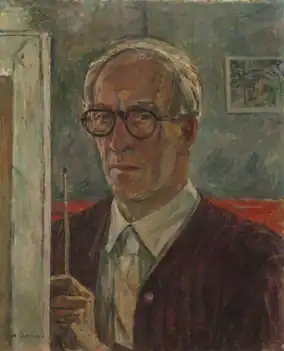
Clive Gardiner (3 April 1891–15 May 1960) was a British designer, illustrator, printmaker, painter and teacher. An important artist in his own right, Graham Sutherland said of him: 'Everything worthwhile I learnt, I learnt from him.'[1]
Early life
He was born as Alfred Clive Gardiner in Blackburn in Lancashire,[2] the son of Ada née Claydon and the journalist, editor and author Alfred George Gardiner (1865–1946), the editor of The Daily News. Clive Gardiner was educated at University College School. Aged 16 Gardiner went to Paris which inspired his interest in the works of Paul Cézanne[3] and French modern art in general which lead to his interest in Cubism, Futurism and Surrealism.[4] He considered a career in journalism, but instead studied at the Slade School of Fine Art from 1909 to 1912. He attended the Royal Academy Schools during 1913 to 1914. During World War I he served at the Ministry of Munitions and, after successfully completing an art teaching course, he taught at the Brighton School of Art. His book illustrations at this time included plates for Pillars of Empire: Studies and Impressions (1918), Leaves in the Wind (1918) and Many Furrows (1924). With the encouragement of Pierre Puvis de Chavannes he exhibited for several years at the Royal Academy and the New English Art Club.[5]
Career
In 1918 he was appointed a part-time teacher at Bolt Court Technical School and at Goldsmiths' College School of Art, where he was Acting Warden in 1953 and Headmaster of the Art School (1929-1958). Gardiner is credited with moving the Art School in the direction of 'higher education in art', introducing formal teaching and respect for the Impressionists and Modernism.[1][6] Gardiner taught at the Sir John Cass Technical Institute and was a founder member and later a college principal of the Blackheath Art Society in 1947, with Graham Sutherland as the first President, along with college principals Leonard Daniels, Hebert Matthews and John Mansbridge.[7]

In 1924 he gained recognition for the murals he painted for the British Empire Exhibition.[1] Turning to illustration, he provided artwork for books written by his father as well as taking up portrait painting and was involved in designing a series of large posters promoting British and Empire produce and places. Among his poster designs were 27 for London Transport, many of which were influenced by his interest in Cubism, such as 'Kew Gardens' (1928) and 'The Tower of London' (1927), and Futurism, as shown in his design 'Save Time – Be on Your Way with a Season Ticket' (1928) and 'Season Tickets Save Time' (1928). As a poster artist for Shell Petroleum he took part in the Modern Pictorial Advertising exhibition held at the New Burlington Galleries in London in 1931. In addition, Gardiner designed posters for the Empire Marketing Board (1926-33).[8][9][10]
During World War II Gardiner advised on the design and décor of the British Restaurants for the Ministry of Food.[3] In his later years he became interested in watercolour painting and small oil landscapes.[4] The Arts Council of Great Britain held a posthumous exhibition of his work in 1963. His pupils including the painter Carel Weight and the designer and typographer Charles Hasler.
Personal life
In 1920 he married Lilian Adelaide Lancaster (1888-1973),[11] an artist and a pupil of Walter Sickert. With her he had two sons, the academic philosopher Patrick Gardiner and the writer and architect Stephen Gardiner.[5]
Clive Gardiner died at St. Stephen's Hospital in Chelsea in 1960. He left an estate valued at £20789 12s. 8d.[12]
References
- 1 2 3 Goldsmiths History Timeline 1930s Goldsmiths History Project
- ↑ Lancashire, England, Church of England Births and Baptisms, 1813-1911
- 1 2 Alfred Clive Gardiner (1891–1960), British Council website
- 1 2 Clive Gardiner, artist and educator, The History of Arts Education in Brighton, University of Brighton
- 1 2 Clive Gardiner (1891–1960), Art UK website
- ↑ Firth, A E (1991). Goldsmiths' College. A Centenary Account, London: Athlone Press. p. 156
- ↑ "Blackheath Art Society". www.artbiogs.co.uk. UK: Artist Biographies: British and Irish Artists of the 20th Century. Retrieved 26 May 2017.
- ↑ Buckman, David. Artists in Britain Since 1945, Art Dictionaries Ltd, part of Sansom & Company
- ↑ Clive Gardiner, Art Institute of Chicago database
- ↑ Poster: Hampton Court, by Clive Gardiner, 1927, London Transport Museum Collection
- ↑ Lilian Adelaide Lancaster in London, England, Church of England Marriages
- ↑ Alfred Clive Gardiner in the England & Wales, National Probate Calendar
External links
- Clive Gardiner 1891–1960 Tate database